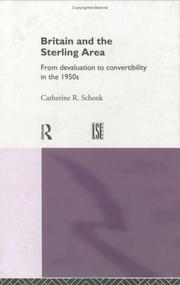| Listing 1 - 3 of 3 |
Sort by
|
Book
ISBN: 0521231655 0521068568 0511895623 Year: 1981 Publisher: Cambridge : Cambridge University Press,
Abstract | Keywords | Export | Availability | Bookmark
 Loading...
Loading...Choose an application
- Reference Manager
- EndNote
- RefWorks (Direct export to RefWorks)
Britain's abandonment of the Gold Standard in 1931 raised new economic policy problems both for Britain and for the countries of the Empire, who had to decide whether to follow sterling off gold and, if so, whether to peg their currencies to sterling. By exploiting archival material, the author casts fresh light on the debates and financial diplomacy of the period, and provides a fuller understanding of several key issues: the formation of the sterling area, the World Economic Conference of 1933, and American concerns about the price and course of sterling.
GB / United Kingdom - Verenigd Koninkrijk - Royaume Uni --- 331.156 --- 333.432.3 --- 333.451.6 --- 338 <09> --- 336.74 <410> --- Foreign exchange rates --- -Sterling area --- -Monetary unions --- Exchange rates --- Fixed exchange rates --- Flexible exchange rates --- Floating exchange rates --- Fluctuating exchange rates --- Foreign exchange --- Rates of exchange --- Geldwezen van 1914 tot 1945. --- Sterlinggebied. --- Vlottende wisselkoersen. Crawling peg. --- Economische geschiedenis --- Geld. Geldwezen. Monetaire sector.--?<410> --- History --- Rates --- -Geldwezen van 1914 tot 1945. --- 336.74 <410> Geld. Geldwezen. Monetaire sector.--?<410> --- 338 <09> Economische geschiedenis --- -338 <09> Economische geschiedenis --- Sterling area --- Monetary unions --- Geldwezen van 1914 tot 1945 --- Sterlinggebied --- Vlottende wisselkoersen. Crawling peg --- Business, Economy and Management --- Economics --- History.

ISBN: 041509772X 1138865796 128013982X 0203982401 1134860552 1134860544 Year: 1994 Publisher: London ; New York : Routledge : LSE,
Abstract | Keywords | Export | Availability | Bookmark
 Loading...
Loading...Choose an application
- Reference Manager
- EndNote
- RefWorks (Direct export to RefWorks)
To complement current work on the British domestic economy in the post-war period it is necessary to examine external economic policy. Whilst considerable work has been done on Britain's relations with Europe and with America, the complexities of the sterling area have remained obscure. This volume makes a significant contribution to unraveling the strands of British external economic policy in the post-war period.
International finance --- Great Britain --- GB / United Kingdom - Verenigd Koninkrijk - Royaume Uni --- 333.844 --- 331.30 --- 333.820 --- 331.157 --- 331.156 --- 333.432.3 --- 333.846.0 --- Devaluatie en opwaardering. Stabilisering. J curve. --- Economische toestand. --- Geldbeleid, bankbeleid en kredietbeleid: algemeenheden. --- Geldwezen sedert 1945. --- Geldwezen van 1914 tot 1945. --- Sterlinggebied. --- Verband tussen het monetair, bank- en kredietbeleid en de economische ontwikkeling: algemeenheden. --- Foreign exchange rates. --- Foreign exchange rates - Great Britain. --- Monetary policy. --- Monetary policy - Great Britain. --- Sterling area. --- Monetary policy --- Sterling area --- Foreign exchange rates --- Finance --- Business & Economics --- Money --- Economic conditions --- Foreign economic relations. --- Exchange rates --- Fixed exchange rates --- Flexible exchange rates --- Floating exchange rates --- Fluctuating exchange rates --- Foreign exchange --- Rates of exchange --- Geldwezen van 1914 tot 1945 --- Geldwezen sedert 1945 --- Economische toestand --- Sterlinggebied --- Geldbeleid, bankbeleid en kredietbeleid: algemeenheden --- Devaluatie en opwaardering. Stabilisering. J curve --- Verband tussen het monetair, bank- en kredietbeleid en de economische ontwikkeling: algemeenheden --- Rates --- Monetary unions
Book
ISBN: 110721081X 1282536338 9786612536335 0511678827 051167757X 0511682050 0511684037 0511676492 0511680074 9780511677571 9780511682056 0521876974 9780521876971 9780521876971 1107612993 Year: 2010 Publisher: Cambridge : Cambridge University Press,
Abstract | Keywords | Export | Availability | Bookmark
 Loading...
Loading...Choose an application
- Reference Manager
- EndNote
- RefWorks (Direct export to RefWorks)
The demise of sterling as an international currency was widely predicted after 1945, but the process took thirty years to complete. Why was this demise so prolonged? Traditional explanations emphasize British efforts to prolong sterling's role because it increased the capacity to borrow, enhanced prestige, or supported London as a centre for international finance. This book challenges this view by arguing that sterling's international role was prolonged by the weakness of the international monetary system and by collective global interest in its continuation. Using the archives of Britain's partners in Europe, the USA and the Commonwealth, Catherine Schenk shows how the UK was able to convince other governments that sterling's international role was critical for the stability of the international economy and thereby attract considerable support to manage its retreat. This revised view has important implications for current debates over the future of the US dollar as an international currency.
Pound, British --- Monetary policy --- International economic relations --- Monetary management --- Economic policy --- Currency boards --- Money supply --- British pound --- English pound --- Pound sterling --- Sterling area --- History --- Arts and Humanities --- Pound, British - History - 20th century --- Monetary policy - Great Britain - History - 20th century --- International economic relations - History - 20th century --- 332.494109045 --- 331.157 --- 333.432.3 --- 333.432.8 --- 333.453 --- AA / International- internationaal --- GB / United Kingdom - Verenigd Koninkrijk - Royaume Uni --- Geldwezen sedert 1945 --- Sterlinggebied --- Internationale monetaire organisatie. Internationaal Muntfonds. Algemene leningovereenkomsten --- Internationale munt. Rekeneenheden
| Listing 1 - 3 of 3 |
Sort by
|

 Search
Search Feedback
Feedback About
About Help
Help News
News